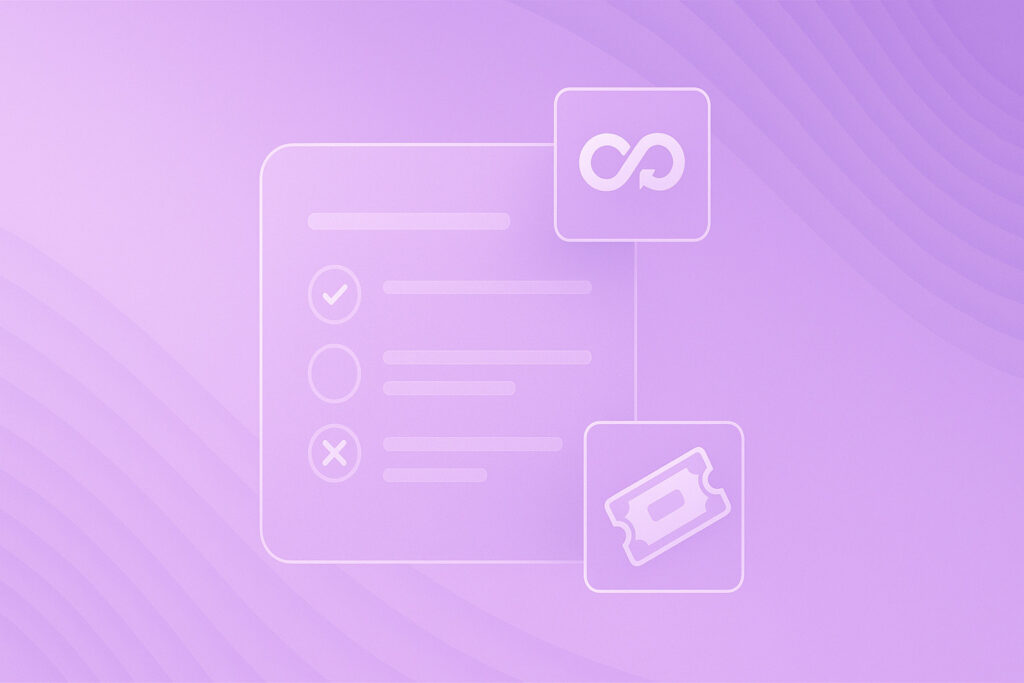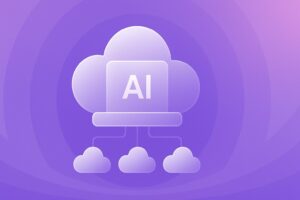Have you been paged at 2 a.m. to restart a pod or rotate a cert? Yes?
Then you already know: most DevOps tickets are déjà vu.
The surprise?
AI can now handle the majority of those incidents on its own, before you even wake up.
AI can detect, triage, fix, verify, and document many of the routine tickets from end to end. Real teams already report 50 – 80% auto-resolution on common incidents. Plus, they’re seeing big cuts to MTTR.
The AIOps market is projected to reach $47.82 billion by 2030. And compliance work like SOC 2 is getting an AI lift through continuous control monitoring and evidence collection.
In this article, we’ll show you just how DuploCloud ties this together in the stack.
Key Takeaways
- Most DevOps tickets are repeatable and now automatable. AI can handle the bulk of low-risk incidents like restarts, cert rotations, and queue clears. That means fewer 2 a.m. alerts and more time for real engineering work.
- AI is moving teams from firefighting to foresight. Modern AIOps platforms detect issues early, act fast, and document everything, cutting alert noise by up to 99% and slashing MTTR by as much as 70%.
- Automation only works when it’s built on a solid foundation. DuploCloud brings AI and compliance automation directly into your infrastructure, so fixes, evidence collection, and guardrails all live in one place.
Why AI Solving 80% of DevOps Tickets is Realistic
Obviously, a huge number of your tickets are repeatable: noisy alerts, full disks, stuck pods, flaky health checks, expired certs, runaway queries, and “can you restart X.”
Now, autonomous SRE agents and AIOps platforms can handle most of these. And they require zero human touch.
BigPanda customers report 80% alert noise reduction within eight weeks of implementing their platform. And they often exceed that over time. In BigPanda’s 2025 Observability Report, 82% of customers achieved at least 97% noise reduction.
Many reduced their alert noise by 99.5–99.9%. Here’s the catch: these tools are great at noise reduction and eliminate false positives and duplicate alerts. That differs from resolving actual customer-impacting incidents. The 80% figure reflects only automatable tickets,
Across providers, teams see 30-70% faster resolution times when AIOps + automation replace manual workflows. Leading AIOps implementations report 70-90% reduction in incident investigation time. Novel incidents and architecture decisions without runbooks still require human expertise
We’ve seen substantial evidence that AI cuts resolution times. It does so by:
- Correlating signals
- Pinpointing root cause
- Triggering runbooks
Agentic AI in DevOps
And the benefits extend far beyond traditional AIOps. Agentic AI is transforming ITSM practices in 2025, with 79% impact on incident management and 73% on knowledge management. And these autonomous agents don’t just detect problems. They take action, make decisions, and continuously learn from outcomes.
Organizations are now tracking new AI-driven KPIs, including:
- Ticket deflection rate: Percentage of inquiries AI chatbots handle independently
- Cost reduction per ticket: Efficiency gains from AI automation
- Predictive accuracy: How well AI prevents issues before they escalate
AI ticketing now solves 30% of tickets at the outset. It also returns over 70,000 hours of productivity annually to employees and agents.
The 5-step Loop That Lets AI Close Tickets
1. Detect and enrich
AI can scan logs, metrics, traces, events, and change data. It can also learn normal patterns, flag anomalies, and enrich alerts with context like recent deploys or config edits. Modern platforms use machine learning to automatically detect anomalies without pre-configured thresholds.
2. Triage and dedupe
Related alerts collapse into one incident with a prioritized hypothesis. Noise drops. BigPanda data shows substantial time saved from eliminating false positives and duplicated alerts. IBM research confirms that AI can reduce IT alert noise by 50% and eliminate 80% of time spent fixing false-positive incidents.
3. Decide and act
Verified runbooks get mapped to conditions. For example, you can recycle a pod, roll back a canary, rotate a cert, clear a queue, scale a node group, or toggle a feature flag. AI agents can execute through RBAC. Higher-risk actions can be gated for approval.
4. Verify and auto-close
Agents can even check golden signals after changes. And when error budgets and SLOs are back in range, the agents can close the tickets with a summary and notes.
5. Document and learn
Finally, post-incident write-ups, timelines, and RCAs can be drafted automatically and pushed to your ITSM and knowledge base. By 2027, generative AI is expected to create more IT support articles than humans.
Compliance automation: what it does and doesn’t do
You can now:
- Continuously monitor controls. Integrations keep an eye on asset inventory, IAM drift, logging, encryption, vulnerability scans, and change management. Failures immediately trigger tickets for investigation.
- Collect evidence faster. AI agents can pull and attach relevant logs, configs, and screenshots to controls. This reduces evidence-gathering from days to hours.
- Here’s what still requires humans: Scope decisions, exception approvals, policy interpretation, and auditor discussions. Compliance automation handles paperwork, but not judgment calls.
The real win: You move from audit-crisis-mode, scrambling in the final weeks, to continuous readiness (checking constantly, so audits aren’t chaos).
ROI Impact: According to IDC, Vanta customers see 526% return on investment over three years. They’ve found that the platform pays for itself in just three months. And they get average annual benefits of ~$535,000/year.
The vendor landscape at a glance
AIOps and incident automation
- BigPanda: Powerful alert noise reduction and correlation, with customers achieving 97-99.9% noise reduction
- ServiceNow Now Assist: Enterprise-grade automation with deep ITSM integration
- Dynatrace Davis AI: Advanced root cause analysis and predictive insights
- Splunk AIOps: Machine learning for IT operations with extensive data correlation
- LogicMonitor Edwin AI: Reduces alert noise by 80% with intelligent automation
Compliance automation leaders
- Vanta: Supports 30+ frameworks with AI agents for automating evidence collection. IDC reports 526% ROI over three years
- Drata: AI-native platform with deep automation and real-time monitoring
- Secureframe: Structured, guided compliance experience for non-technical buyers
- Scrut: Awarded 11 Momentum Leader badges by G2 in 2025, 80%+ automated evidence collection
- Sprinto: End-to-end control with pre-built programs and automated workflows
Be mindful: none of these tools replaces your good judgment. What they do is remove toil and bring your attention to the few tickets that truly need a human.
Guardrails that keep AI safe and audit-ready
- Human-in-the-loop: This applies to risky or high-impact changes. You’ll get auto-approval only for clearly low-risk tasks.
- Tight and least-privilege IAM: You’ll get change windows and scoped permissions. That way, agents only do what they are allowed to do.
- Full audit logging: Every action (automated or manual) will be logged into SIEM/ITSM for you with immutable timelines for SOC 2 evidence.
- Separation of duties: You’ll be able to ensure deploy, approve, and audit functions are cleanly separated.
What this means for your team
- Fewer after-hours pages: Predictive AI will prevent issues before they impact your users.
- Better postmortems: Higher quality documentation is auto-generated, and knowledge is reused.
- Faster recovery: You’ll see 50-80% fewer false positives and unnecessary escalations.
- Continuous SOC 2 readiness: Your evidence will be collected constantly rather than in audit-crunch mode.
Where DuploCloud fits
Of course, you still need an environment that makes AI effective. DuploCloud gives you that foundation:
Unlike BigPanda (alert correlation) or ServiceNow (ITSM-focused), DuploCloud’s AI Help Desk runs inside your AWS, Azure, or GCP environment. Therefore:
- AI agents have native access to your infrastructure, and not just log aggregation
- Compliance controls and security policies are enforced at provisioning time, not as an afterthought
- Your team interacts through natural language in Slack or our web portal. No need to learn new tools
- Every action is audited as part of your infrastructure and not exported to a separate compliance tool
With DuploCloud, AIOps and compliance automation are not bolt-ons. They live on your platform from day one. That’s how you turn “AI That Gets Stuff Done” from a slide into a calmer on-call rotation and a cleaner audit trail.
DuploCloud’s AI Help Desk: Making 80% Automation Reality
DuploCloud’s new AI Help Desk takes all these innovations even further.
You’ll get specialized, always-on AI teammates that understand natural language. They can resolve DevOps issues in real-time.
Just think of it as having an expert DevOps engineer available 24/7 who:
- Never sleeps
- Never gets frustrated
- Learns from every interaction
Here’s how DuploCloud’s AI Help Desk makes the 80% automation promise real for your business:
Instant Issue Resolution
No more waiting for human intervention. Now you can describe your problem in plain English. For example: “The Redis service is crashing in production” or “Need to scale up the payment processing pods.”
The AI Help Desk immediately gets the context and checks your environment. It then either fixes the issue automatically or gives you step-by-step guidance.
Proactive Infrastructure Management
Our AI agents continuously monitor your AWS, Azure, or GCP environments. Then, they identify potential issues before they become incidents. They automatically apply the 5-step loop we described: detect, triage, act, verify, and document. And they do it all without human intervention.
Compliance-First Automation
Every action taken by the AI Help Desk is logged, audited, and aligned with your compliance requirements. Maybe you’re working toward SOC 2, HIPAA, or PCI compliance. Whatever the case, the AI ensures every automated action will follow your established security policies. Then, it generates the evidence you need for audits.
Learning Your Environment
The best part? The more you use DuploCloud’s AI Help Desk, the smarter it gets about your specific infrastructure, applications, and operational patterns. It learns your team’s preferences and understands your business context. Of course, it also becomes increasingly effective at preventing and resolving issues unique to your environment.
The bottom line: It’s not just automation. It’s intelligent automation. It understands your business, speaks your language, and gets smarter every day.
Book a Demo with DuploCloud
Ready to see 80% automation in action?
See how DuploCloud’s AI Help Desk works: Schedule a 15-minute walkthrough where we’ll show you a live incident resolution, compliance evidence collection, and how your team would interact via Slack..
See firsthand how our specialized AI DevOps Engineers can handle the bulk of your DevOps tickets. And you’ll be able to focus on building great products.
FAQs
Can AI actually handle 80% of DevOps tickets without any human oversight?
Yes! But… with nuance. Most of the automation happens on repeatable, low-to-risk tickets. You’ll see:
- Restarting pods
- Clearing queues
- Rotating certs
- And so much more!
The high-risk changes will, of course, require approval from humans. The 80% figure reflects the proportion of tickets that AI can take on because they’re low-complexity and automatable.
How can AI possibly avoid making risky changes in production?
Through guardrails. On AIOps platforms, you’ll get options like:
- RBAC
- Change windows
- Human-in-the-loop approvals
- Full audit logging
This’ll help you make sure that your AI agents only act within scoped permissions. You’ll also be confident that any uncertainty is escalated to humans.
Will adopting AI in DevOps replace engineers on my team?
No way. The goal is to get rid of toil, not talent. AI just takes care of the repetitive, time-consuming tickets. That way, your engineers can focus on architecture, scaling, security, and innovation. In fact, teams that adopt AIOps usually report higher productivity and prevent burnout. They don’t see fewer engineers.
How quickly can teams see results after implementing AIOps?
Quickly! Many organizations see a significant reduction in noise, up to 80% within the first weeks of deployment. You’ll notice that auto-resolution rates climb over time as the AI learns about your environment. It also integrates with runbooks and adapts to your operational patterns.
Sources and Further Reading
- BigPanda Monitoring & Observability Report 2025 – alert noise reduction statistics
- BigPanda AIOps Implementation Results – 80% noise reduction in ~8 weeks
- Vanta IDC White Paper: “The Business Value of Vanta” – 526% ROI in 3 years; ~$535,000/year benefits
- AIOps Market Growth and Statistics
- AI in IT Operations – Comprehensive Statistics
- ITSM Trends 2025: Agentic AI Impact
- DevOps AI Tools Comparison
- SOC 2 Compliance Automation Guide
- Incident Response Automation with AI
- DuploCloud AWS Collaboration Announcement



